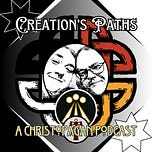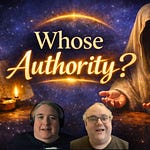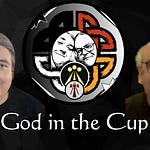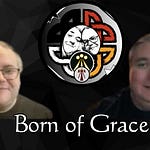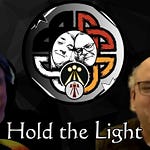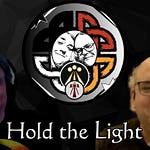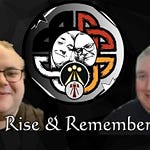May the blessings of Lunasa via upon you and your family. As we celebrate this time of gathering the first fruits. Of getting together. If. Making peace and building our communities and relationships together.
Hello everyone. My name is Charlie. I am a non-binary scifi fantasy writer and. I am. Here to start doing a lot more. Creations Paths. You're going to get a lot from us. We're going back to a daily format. Which for anybody who has been a longtime listener was how this podcast started. And we're going back to that.
And notice. I did say we, this is one of the things that's going to be changing, going forward. A lot of the episodes are going to be. Both me and my husband, Brian.
Hello.
And we are going to be talking about a lot of different things and we're tying this to the calendar and to a lot of the holidays. we're hoping to make this a special experience for everyone else. There's even an episode on the schedule. That is one of the most requested episodes. Be looking out for that. Yeah. we are eventually going to talk about offerings and what all that means. Definitely look forward to that.
Today we're going to be talking about. Lunasa because it is Lunasa. Today, as this episode goes out, And this is a holiday. That means a lot to me.
I want to say right off the bat, this is not a primer. For the holiday. We did that with our livestream. For Bealtaine. That was a lot of fun. But it was also a lot of prep work and I felt in some ways, like we were replicating the work that others had done in some instances done better. So I would recommend if you're not familiar with Lunasa and how it is practice to go over to the Irish pagan school and check out Laura and John's resources over there.
We are not affiliated in any way, other than I have taken a lot of their classes. And I really liked the work that they do. I love their YouTube channel. I love their blog. I am part of the Morgan academy as well. I really like and support what they're doing and they have some really good resources for how to celebrate Lounasa and all of the holidays. If that is something you're into as well as Traditional Irish folk magic and draiocht and all of that. So definitely check them out.
If we're not talking about how to celebrate Lunasa, What are we going to be talking about?
We should at least start with a general. What are the themes? What is Lunasa?
So if you're not familiar with the holiday of Lunasa, Today is at least in my mind, the way I think about today, this is a celebration. Of the sacrifice of Tailtiu, who was the foster mother of the Tuatha Dé Danann King actually, at one point, Lough. Who is one of the most amazing characters in all of mythology. I've made no secret that I have a very strong devotion to Bridgid. But I have a soft spot for Lough. Lough is a diety who is many skilled. He can do just about anything and I'm not going to go in to all of his mythology right out, even though that's all I want to do is tell stories about him. The classic tale of where this holiday comes from, his foster mother, Tailtiu went into the fields and sacrificed her life so that the land would give forth grains so that the land would be fertile and good for habitation. And in her dying breath she asked her foster son, Lough, to set up a celebration in remembrance of this. That is where we get Lunasa from.
Lunasa comes from the old Irish and middle Irish, Lugh Nasad. Which means the gathering or assemblies of Lough. In fact Nasad in the old Irish meant funerary. Simply, it came to just mean assembly when you get together. And so they would have all means of celebrations and games. People would show off their arts and all that they had gotten from the first gleaning of the harvest.
One of my favorite little things about this is one was considered needy if they harvested before Lunasa and if they did not have a harvest at Lunasa they were said to be wind to farmers. Really. They hadn't really done the work on, in the land to bring up what it needed to be harvested.
One of the things I really like about this is it's a nice punctuation throughout the year. Because when you're thinking of the year and the cycles as it goes. We already had the time of planning and the time of planting and growing. And now we're starting into the season where we're harvesting the first of the fruits. We are entering that season, that time of harvest and time of year of harvest. And I really like being able to take a minute, take a moment to just put oneself in context with life, with nature, with the environment and just be like, oh yeah, ok.
This is first of the three harvest festivals, which will of course, culminate on Salwen and, oh are we going to have a lot to say when Salwen comes around.
Because our ancestors, our ancestors ancestors, our ancestors, ancestors, ancestors. Our ancestors, ancestors, ancestors, ancestors. Now I'm just kidding.
It gets a little Mulan up in here. And shame upon your family and shame on your cow…
But this is the first of the three harvest festivals. I think that we have lost touch with the idea of harvesting. Because we are no longer an agrarian society. And as somebody who grew up on a farm. I did as a child, we grew a lot of the food that we ate. I remember how connected to the land that made us feel. And it's a very different sense of living when you know that not all the food that you were going to be eating is going to be coming from the grocery store. That you are responsible for growing it here. Out there, tilling the soil, you're planting in the soil. I remember sitting up guarding the crops from the rabbits. I remember my dad doing that at night because the rabbits were coming in and eating our food. And that was our food. We needed it. There's a lot of connection there to the earth and to nature that comes with that.
We tend to get very separated from that concept now because we just go to the grocery store. While there is this trend that's been going on over the last 10, 15 years of trying to eat seasonally and trying to connect back to the cycles. We are living in this very globalized civilization where you can get fruits and vegetables all year round.
You're not as tied to the cycle. So the idea that people would be having their first bit of bacon for the year is coming now. We can just go to the store and there's always bacon at the store. Right? And so we've lost that kind of connection. To the importance of the harvest. And what that actually means. And the few times we actually hear that term in the modern world.
It's being used by Grifters who are trying to use more agrarian terms too mask they're more capitalistic impulses. Right where you're trying to harvest a data or you're trying to harvest money or you're trying to harvest an audience or God forbid when I hear those preachers talking about harvesting souls. You know, like souls are ours to have or anything. When you often hear that term nowadays, it's being used to mask other things and not really focusing on this idea of this is what I have done, what I have done in concert with nature, in concert with the one life that is flowing through all of nature. And this is the work of my hands. This is the work of my soul. This is the work. That sustains me. And that to me is what we're talking about here with the harvest festival and especially those first fruits. And really trying to reconnect to that idea of, today we are celebrating what we have gathered that sustains us.
Not only that, but we're also celebrating the creative works that we have engaged in. That were planned for and put in action. And so it doesn't even have to be like, yes, it's wonderful If you planted a garden and you have some fruits and stuff coming in now, but it doesn't have to necessarily be just planting. It's harvesting. You know, if you drew a picture, it's reconnecting oneself to that moment and celebrating. Taking a minute to just celebrate. Heck, it could be like, an ugly child's drawing that ends up on the fridge, the five-year-old's picture. It's still taking that minute to just appreciate and celebrate. Engaging in the act of creation. And even for ourselves. Because so often we create these things and we don't even recognize. Recognizing that we just participated in an act of creation. And we don't appreciate. Take that moment to just celebrate it. And so often we just, we finish, we move on to the next and it's, that part of that disconnecting. I think that's the thing that so many are searching for is that reconnecting. It's also part of the point of the holiday. You know, that they are doing the celebrating of the creation this holiday to reconnect oneself back into the community, back with oneself, with her environment, with their creative works, and to bring the Tuatha, the tribe back together.
I think. More than anything else. We don't celebrate other people's achievements either.
We have gotten to this place. Where we just, are.
Yeah. And we're constantly doing. Do and move on to the next. do and move on to move on. Or it gets so commoditized in our capitalistic society we live in. It is a finished product and now it must be sold and debased.
It really feels that way. Framed in a way. And it's so sad because there's nothing wrong with selling. There's nothing wrong with this, getting a check, because there are things we like to buy and having toys and what not, fun things in our life, but we forget to have that moment when we celebrate the first harvest before we turn around and get paid for the service or the creative work or whatever it is. And it's like, we skip that step. And it leaves a disconnect. And of course it also then makes the whole act more crass.
It's just one of those wonderful moments of the holiday that I like, it is that reminder. Because, as a chef, I often forget, because it's that same thing. You make a meal, it's done. People eat it. It's very impermanent. In the moment. And if all the focus is on just, I create the meal and I get paid for it, it debases the whole thing.
One of the things that I think about probably more than is this healthy or natural is, really looking at the three marks of creation or the three Dharma seals or the three Dharma keys. I've heard it said all three ways. The first of which is impermanence, that nothing lasts forever. That things go, things pass and remembering that. Of course, then you have, anatta, you have no self and you have shunyata that everything is empty of separate self. The third one is actually that there is Nirvana. There is even a sensation too the endless cycle. When we're looking at that impermanence, there is this need for celebration. That, to punctuate everything.
I am so done. With this kind of Doomer attitude that has taken over everything. Where we are always talking about what's bad, what's wrong, what's imperfect, what's not going to work, what we can't do, and not celebrating what achievements we have. What things we can do. What things we have done. And to me that Doomerism that is so ubiquitous right now, that invalid nihilism of just to everything's bad. Well, no, not everything is bad. You have to have moments of joy. You have to have moments of celebration and you have to have moments of reckoning, where you realize, yeah, we did this amazing thing.
And it can be a little thing. I remember like last Lunasa. I made this a Blackberry crumble. And it really didn't turn out the way it was supposed to. It really didn't. I don't even know how to describe what went wrong with it. The topping got a little too Sandy. It crumbled too much. It just crumbled way too much. And I wanted to be really upset about it because it wasn't perfect. But, you know what it crumbled in and mixed into that ooey gooey yumminess of the blackberries. That the syrupy blackberries had stewed in all of that yummy buttery, sugary goodness in there. That if it had been the crumble that I wanted in my head, I don't know that it would have paired with the blackberries as well. And so that lack of perfection in what I had made was an advantage. That I had to struggle to see. Like you had to remind me several times, like, no, it actually works. It actually works. It's just maybe not in the way that you originally intended, but it actually works. And that. That to me is just microcosmic, glee. Analogous to all of the problems that we have right now is yeah, I want big change. I want a lot of things to go better for a lot of people in a lot of different ways. But when we neglect. To celebrate the little things, the little victories, the little, sometimes it's just the smallest good thing that can happen.
All we're doing is robbing ourselves of that moment of joy.
To that point. Reminds me of a couple things. One of the things I love about the season and all. It reminds me of that, Ki Tov. You know, in, in the story of creation. Ki Tov. It is good. God created it, it is good. God moved on. Created this, it is good, moved on. It is remembering that. It's good. Celebrate that. And it's okay to have ambitions. To want to make things better because it's okay to improve on things that is part of our path. That's part of our journey is to take something that's good and make it better. But also to recognize and celebrate. Each step. You might not make it too perfect. But if you've made it better, Than it is good. I was just thinking, what a fun meditation to have, a simple meditation to have, would be to… Have a good flight of steps that are somewhere in your vicinity. If it's something somewhere pretty that you would enjoy being around a little bit longer, then maybe pick that flight of steps, rather than something busier, or that might be more congested. And just take one step. And go, “It is good”. Celebrate that you took that step. then take one step more. And go, “It is good”. And each step, pause for a minute, and just go, “Ki Tov”. Accept that it is good. Look around. Enjoy the environment. See where you are. Take that next step. It could take an hour to get up that one little flight of steps, but you know what, eventually you will be at the top of the steps even going at that slow pace. And it's just that nice reminder in life, take those moments to celebrate that.
I've had a lot of arguments with people about the, especially that passage in scripture. Just because they want to believe that there was no evil in the world prior to that, and when I say evil, I'm talking about the things that we would now consider evil that. Maybe our ancestors didn't. Like animals weren't eating other animals. That there was no death. There was no…
The lions lay down with lambs, then they get hungry and they eat the lamb, but they still lay down with them with their bellies full they're going to take a nap. But that's the thing, you know, It's good. Not perfect. Yeah.
In a perfect world. Would we all just, I don't know, get all the nutrients we need from sunlight and air, maybe. I don't know that it would be great to be a plant. I don't know. I've had. Many meditational experiences where you sit and, imagine yourself as a tree or something like that. I can see advantages to being still in one place and rooted in the ground and all that, but also. Rooted in the ground. Our trees aren't. Tolkein ents right there. Not. Getting up and moving around and walking around and doing things they're stuck there. There is a trade off to that. And there's a trade-off for everything.
I think there's an instinct that we have that has only gotten exacerbated by the world that we currently live in. That those trade-offs. Are both unfair. And something that shouldn't have to be made. I've said this before on the podcast. And I saw this in a lot of different places. I am not here for fairness.
I am here for justice. Fairness is each person getting what they deserve. And I don't think that anybody wants to live in a world where you only get what you deserve.
Like the thing I used to love. Having people, somebody that had complained about it, not being fair. And I would sit back and I would go. Could you imagine a world where you woke up in the morning? You were given 10 units of effort. You've spent your 10 units of effort through the day. And you got up the next morning. And you were handed 10 units of effort. And you spend your time. Over and over, this is samsara.
This is suffering. This is the wheel of suffering. This is a Buddhist nightmare. Hellscape. It's a Buddhist hell.
I would disagree. That's not exactly samsara. Yeah, I get your meaning.
Yeah, this is a wheel of suffering like this is, you know. I would rather get up in the day and say it's a tough day, and I've only got one unit of effort. And I use it and somehow miraculously, the next day I wake up and I've got 10 units, or something
Fairness is that whole thing. If you put out one unit of energy, you only get one unit back. there's a problem with that.
Sometimes you don't have the unit to put forward sometimes. You have more energy than, you know, what to do with.
I don't want to live in a world that is. Fair in that way. I want to live in a world that is just. There are people that have disabilities worse than mine and we ought to take care of them. Ought is a justice word when it's used properly. often it's not used properly, which is why we generally shy away from it. Because we like to say a lot of things are oughts when they're not oughts they're shoulds or coulds. But we ought to take care of each other.
We ought to make sure that everyone has a roof over their head and has food in their belly and clean water to drink and shelter from the heat and the storms and the winter cold. Those are the things that we ought to do as a just society. That's what I want. I want a world of justice, not fairness.
And that's really. The heart me. Of Lunasa. Was it fair that Tailtiu? Died. No. Is it fair that Lough had to fight Crom Dubh or Crom Dubh, depending on the version of the story. Because Crom Dubh wanted to have all of the harvest to himself and Lough had to fight him so that the harvest could be shared and everyone could be fed. Is that fair? No. But it is just, it is just, and Lough here is that hand of justice, right? It is. That is that hand. That is coming in and say, no, you can't claim everything. Everything is not yours. We have to help one another. We have to be there for one another. We have to make sure that there's food on every plate. We see this with the Dagda and his cauldron from which no one is ever left unsatisfied.
And that's the key word there. It's not full. It's not over abundance. It's not filled to the point of stuffed, being stuffed. It's no one leaves unsatisfied. If you just need a little food. There's a little food in the cauldron for you. If he needed a lot of food, there's a lot of food in the cauldron for you. What are your needs? You never go away unsatisfied.
This is the holiday where we're celebrating this idea of fighting for that justice and not only fighting for it, but living it. This is why games are very common on Lunasa, right? Because games have rules. We play by the rules and everybody has a good time. If we don't play by the rules, then somebody cheated and we're not having a good time anymore.
Something else i'd like everyone to keep in mind during. The celebration of Lunasa, which does run through the full month. By the way, it's month long of mindfulness.
This is first harvest. This isn't it. This is also a time to look at the plans you've made and to make adjustments and get ready for the second and third harvest. So not only taking that moment to appreciate what you've created, but should you have other projects or crafts or creations that you want to do, It's okay. There's still time. You can go ahead and plan them and do them. And. Continue them. This is a good time to remember that as well.
Yeah, there's this idea of, We missed it or we're not there or we just can't anymore. And I don't think that's true. I'm. Approaching 50. I've got a couple of years left, but I'm approaching 50. And there are so many things that I wanted to have done by this point in my life and there. States that I thought I would be in. At this point in my life. I could be doomerism about it and be like, none of that's realistic, none of that's ever going to happen. None of that. Why. You always try. I think that the reason for a lot of the Dumorism that we have is a combination of both. The deck has been clearly stacked against us in so many different ways. Be that in how the economy is structured. How the government is structured, how. Various political parties are working. How healthcare functions in this country. So on and so forth at ad nauseum, right. You go on and listing all of the ways that things are stacked against us. But I have a friend who has been doing a lot of research in how women got the right to vote. The one thing that I feel is so important to that discussion that I almost feel in everything that I've ever read or seen about the suffragist movement that gets overlooked. This was an impossible fight. They didn't have the right to vote. And then won the right to vote. That's a powerful kind of magic there.
Right? Because they got something that they didn't have. So in a quote-unquote democracy, where people have to vote. To give people the right to vote, which is, let me just think about it. One of the most bizarre ideas ever. That anyone would be denied a voice in a, anything called a democracy, but It's a whole different topic for another time.
But that you would have to, from this place of abject powerlessness. Like women were legally property. When the suffragist movement was happening, when they earned the right to vote, yet they were able to turn the mind of a country.
To get this right. That is so much power. That is so such a powerful thought that we should really burn in our own minds when we're thinking this is not possible, because if you were to tell me that this seed is going to grow up into that tree. Or this seed is going to create all of this fruit. All of these vegetables, right? It seems such an impossible task, right? Harvest always seem. Impossible if you think about them too hard. You put this seed into the ground and all of this food is going to come from that seed. Or all these little bitty seeds, right? It feels. Impossible. It feels. Like we could never do that. And when you look at like real world examples of some of the justice making that has been done. The idea that a marginalized group of people that were legal property. And we can take this in many different ways from the civil rights movement that are still going on to the suffragette movement that I was just talking about.
It feels impossible to win when literally the deck is that stacked against you. This is impossibly stacked against you, right? But yet in small ways and in big ways, victories have been made. And that should give us the strength to carry on with all of the things that we want to accomplish in our life. All of the great Hills that we want to climb all the mountains we want to get to the top of.
People have climbed mountains that are far steeper. Then the mountains that we have to climb. Yeah, we can just go to the 1930s in Europe. And see the great mountains that people have climbed.
Difficult. Yes. Not easy. Yes. But we need to get rid of that idea of impossible. This is the great lesson. I feel, like, I get from Lough every time I read any of his stories. Lough became the master of everything. Because. “Do you have somebody who can do everything?” All right. Well, we already have somebody who can write a poem. We already have somebody who has the strong, we already have somebody who can do that and that, and that, and that… And that wonderful end of that story of how he got in. Right. But do you have somebody who can do all of those things? Well, no. Okay. Well go in. Right. He mastered all of the things that he had to do.
To go back to the thing that we started with at the beginning here. Is that unfair? Yes, that's unfair. But did he get justice? Lough became king. Of the Tuatha.
Lough defeated. Bresh in battle.
Yeah. And it's his namesake that the holiday celebrated for.
Yeah.
And so, you know, victory can be won. That to me is what harvest is. Harvest is victory and victory is harvest.
So in honor and celebration of Lunasa. Remember to take those moments, celebrate your first harvest. Give gratitude to yourself and give gratitude to others as well and in celebration of their harvest.
And more than gratitude, celebrate them.
Yeah. in gratitude, I mean, being grateful. Yeah. It's kind of, part of that celebration.
This could be an entire episode of maybe we eventually want to make that one… Being grateful for something and celebrating it or two different things.
you're right. That probably should be a whole episode in of itself because I have evolved a deeper understanding of what is used as a very simple word for gratitude.
So hopefully you have a blessed and good Lunasa. And that throughout the season, you will find a lot of joy and strength.
I think all of you for listening and supporting.
If you do want to support us, you can head over to our substack. www.creationspaths.com and you can subscribe over there.
I also have a Kofi https://ko-fi.com/cedorsett and a Patreon patreon.com/cedorsett and seed or sit on both of those go to help support everything that I do from the short stories to the games to podcasts like this, where we're talking about spirituality. Thank you to everyone who already do that. And if you can, it really does help out more than you know, plus, if your subscribed over on the sub stack, we are not going to go into it too much, but we are going to do some classes that are going to be going up there behind the paywall for a little bit. To give us the space to make sure that we're definitely answering all of the comments and helping people with any of the questions that they have before they go live for the wider, free audience.
Definitely check that out. Those should be coming in the not too distant future. Thank you all so much for your love prayers and support. It helps more than, you know, And until next time. may, you live in blessings and in light. Bye.


